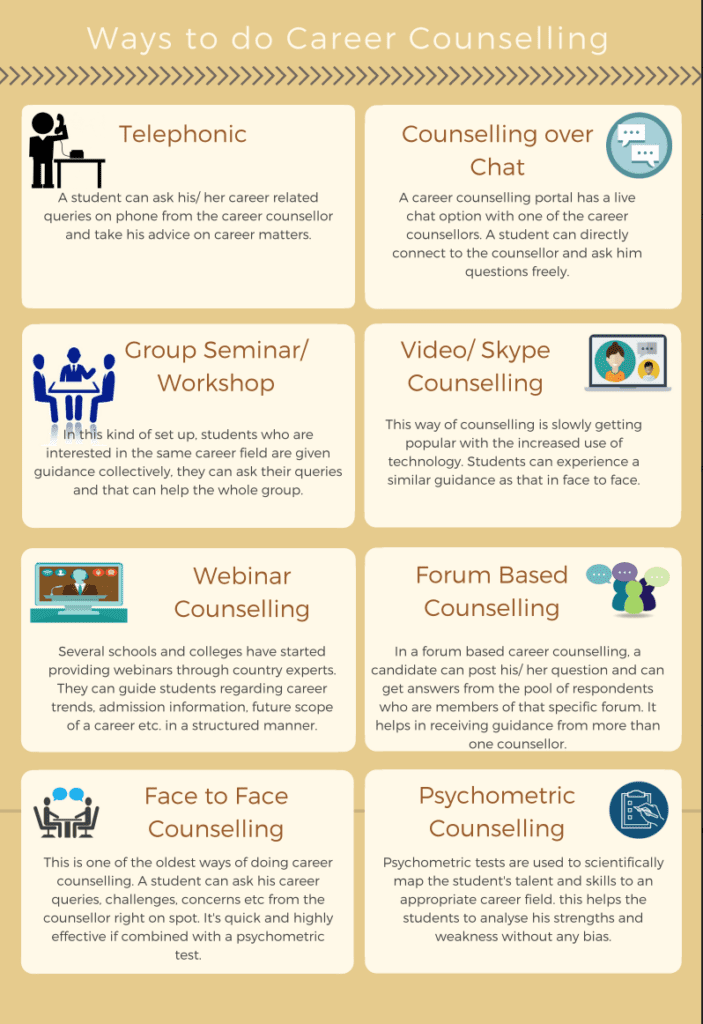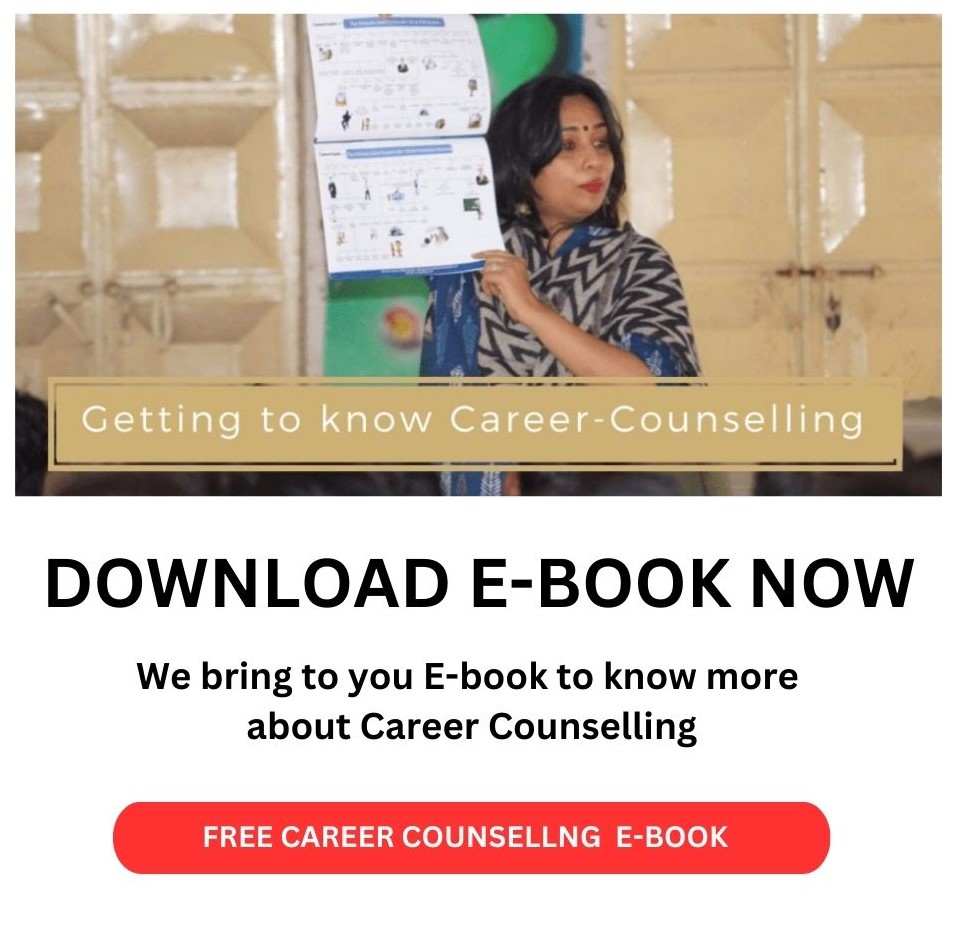Individuals are now enduring constant stress even as they struggle to fulfil their responsibilities at work, due to the increased demand to perform in all areas of activity. Certified career counsellor are the people they frequently look to for assistance and guidance with the challenges that students are facing. A few sessions with a skilled career counsellor can make a significant difference in the stressed-out employee’s attitude, morale, and drive, allowing him or her to make a good contribution at work. Here’s are 9 keys values of career counselling for career counsellors.
Career Counselling for Career Counselors
So, how do trained career counsellors effect this transformation? What traits of mind and heart do they need to support people at all stages of their careers, from choosing the correct career to making a mid-career shift, assisting with a career move, assisting after a job loss, assisting with a tough boss, and so on? Here are some of the qualities and characteristics that professional career counsellors must have and cultivate in order to be successful in the field of career counselling.
Communication Capabilities
Excellent communication skills are at the very top of the list of “must-have” abilities for career counsellor. While they can be obtained to some level throughout graduate school and subsequently enhanced during practice, they must have certain basic communication abilities to begin with. They must also have a natural capacity to listen as well as the ability to communicate and explain their views and thoughts to others.
Q. What are communication capabilities?
A. Communication capabilities refer to the set of skills and technologies that enable individuals and organizations to communicate effectively and efficiently with each other.
Q. How can I improve my communication capabilities?
A. You can improve your communication capabilities by practicing active listening, honing your verbal and written communication skills, seeking feedback, developing your emotional intelligence, and staying up-to-date on the latest communication technologies and trends.
Acceptance
This is a skill that all practitioners in the career counselling for class 12th field and similar fields should possess. Acceptance, which includes being nonjudgmental, necessitates professionals’ ability to relate to clients in an open, nonjudgmental manner. They should be able to accept the client for who they are and where they are in life. They must also show acceptance to their clientele pleasantly and compassionately.
Discretion
Certified career counsellors must be able to earn their clients’ trust, and one of the best ways to do so is to safeguard their customers’ confidentiality. The ability to listen to their clients allows them to create rapport quickly and provide the finest career counselling for class 10th possible.
Empathy
A professional career counsellor must have empathy, which may be defined as the ability to feel what the other person is feeling, to assist clients with their problems. Counselors with empathy are better equipped to imagine their clients’ fears, anxieties, and problems and map out a plan for them. Even if the counsellor does not agree with the client’s point of view, counsellors must be able to comprehend how the client feels in order to successfully handle their difficulties.
Problem-Solving Capabilities
It is not the counselor’s responsibility to solve the problems of their clients, but they must be adept in solving difficulties in order to help them. They must be able to recognize and change negative thought patterns as well as other detrimental habits that may be the source of the difficulties.
Personality Qualities
In order to immediately develop rapport with clients and build meaningful relationships, counsellors must have a good set of interpersonal skills. They should be able to concentrate on the client’s issues and build trust. It’s also crucial that they can fully concentrate on the client during the session and are not distracted by their own problems or concerns.
Flexibility
Flexibility refers to a counselor’s capacity to modify their approach to a client’s difficulties when necessary. When an alternative method is needed, strict adherence to a treatment plan will be counterproductive. One of the most significant characteristics of a professional counsellor is the capacity to alter course and take a different approach to an issue.
A. Flexibility is the ability of joints and muscles to move through a full range of motion without pain or discomfort. It also refers to the ability to adapt to changing circumstances or situations.
Q. Is it possible to be too flexible?A. Yes, it is possible to be too flexible. This condition is called hypermobility or hyperflexibility, and it can increase the risk of injury. It is important to maintain strength in addition to flexibility to support joint stability.
Q. Can flexibility decrease with age?A. Yes, flexibility can decrease with age due to factors such as decreased muscle mass, changes in joint structure, and decreased activity levels. However, regular stretching and physical activity can help maintain flexibility as you age.
Competence In Multiple Cultures
Multicultural competency and a multicultural worldview are required of career counsellors. Counselors with multicultural competency are better able to relate to and comprehend their clients regardless of their ethnicity, religion, income, or other factors.
Interest In Assisting Others
A professional career counsellor should always have the patience and enthusiasm to listen sympathetically to their clients’ difficulties. They should be able to keep their attention on what the clients are saying. It should be highlighted that career counselling entails a persistent commitment to facilitating human-to-human connection and aiming for positive development. Counselors must develop a non-reactive mindset and learn to distinguish between evaluation and observation. This will help you make more precise judgments and establish a relationship with the client.
While finding the ideal job route may not be easy for every young person, with the correct career counselling, young people can succeed in their chosen field. Join CareerGuide if you have no idea how to plan your career. Many students have built excellent career pathways with the guidance of CareerGuide’s best career advisers.
FAQs About Career Counselling for Career Counselors
Q. What skills are required to be a career counselor?
A. To be a career counselor, you need to have excellent communication skills, empathy, active listening skills, critical thinking, problem-solving skills, and the ability to provide constructive feedback. You also need to be knowledgeable about various career paths, educational requirements, and job market trends.
Q. What qualifications are required to become a career counselor?A. Most career counselors have a master’s degree in counseling or a related field such as psychology, social work, or education. Additionally, certification from a professional organization such as the National Career Development Association (NCDA) can also help to enhance your credibility.
Q. What are the benefits of career counseling?A.Career counseling can help individuals make informed decisions about their career path by providing them with valuable information about various career options, educational requirements, job market trends, and employment outlook. It can also help individuals develop job search strategies, improve their resume and cover letter, and enhance their interview skills.















